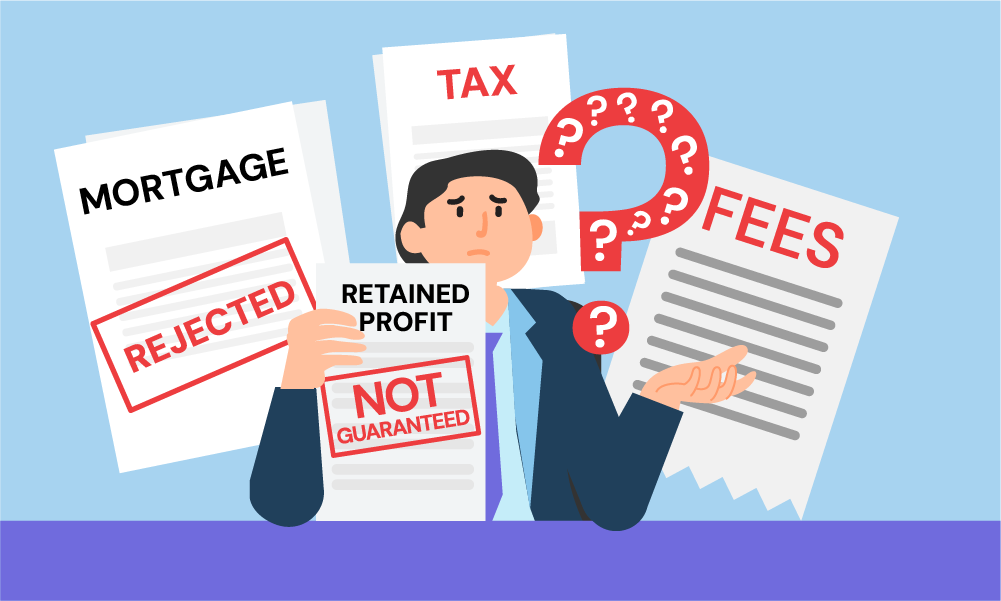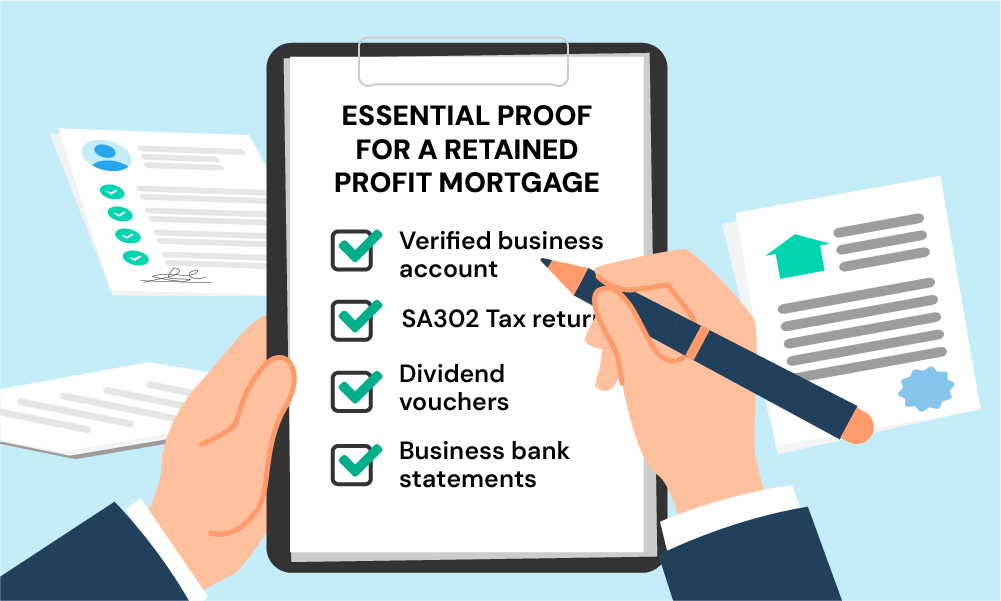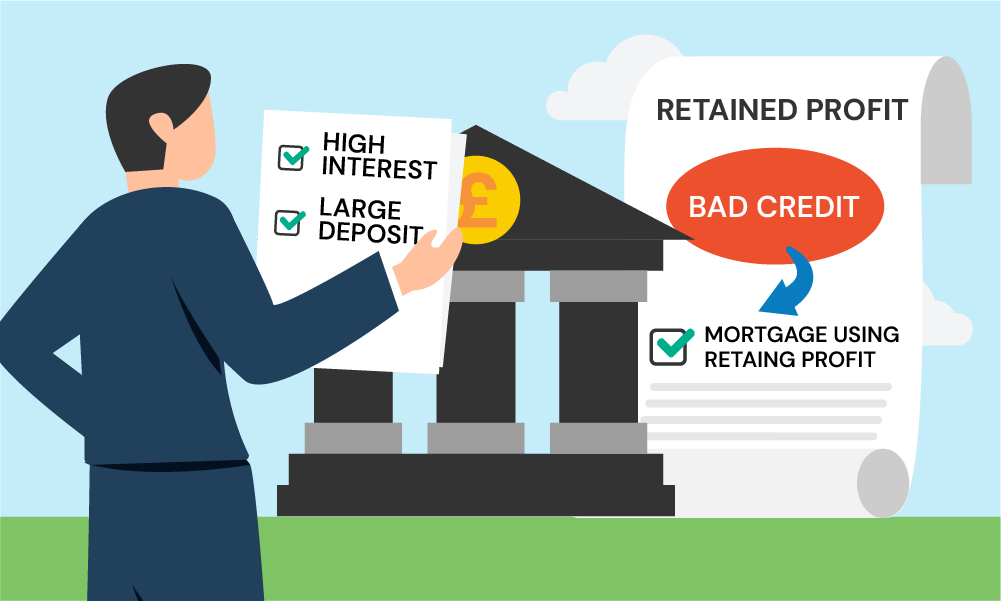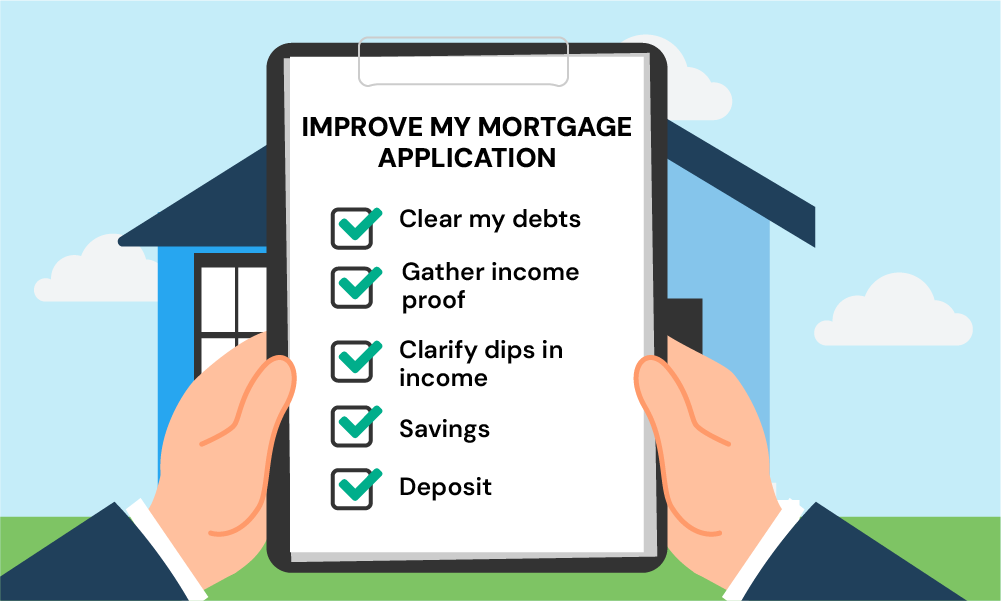- What Exactly Are Retained Profits?
- Why Don’t All Lenders Accept Retained Profit?
- How Can You Use Retained Profits for Your Mortgage?
- What Evidence Will You Need?
- What About Mortgage Rates and Terms?
- What If You Have Bad Credit?
- How Can You Improve Your Position?
- The Bottom Line: How to Take the Next Step
Can You Use Retained Profits For A Mortgage Application?

As a business owner, you’ve poured your blood, sweat, and tears into making your company a success. All those long hours and sacrifices have paid off with healthy profits year after year.
But when it comes time to apply for a mortgage, can you actually use those hard-earned retained profits as income? The answer is yes, you absolutely can – if you know where to look.
Here’s a detailed guide to help you understand how it works and how to navigate the process.
What Exactly Are Retained Profits?
Retained profits, also known as retained earnings, are the money your company keeps from its net income instead of paying it out to shareholders as dividends.
This money is then invested back into the business to fund growth, new projects, or asset purchases. It can also be held as a reserve.
For many entrepreneurs, allowing profits to accumulate creates a nice nest egg.
As the owner, you may be purposefully taking a modest salary and dividends to minimise your personal tax burden.
But those retained profits rightfully belong to you and can be withdrawn at any time.
So it only makes sense they should count towards your income when applying for a mortgage, right? Unfortunately, many traditional lenders don’t see it that way.
Why Don’t All Lenders Accept Retained Profit?
From the lender’s perspective, there’s no guarantee those retained profits will always be accessible to you.
What if the company hits a rough patch and needs to use that cash reserve to keep operating? They need to protect themselves in case your income stream gets interrupted.
Many lenders also rely on automated approval systems that can’t handle complexities like retained earnings.
These systems simply check your salary and dividends on tax returns and base their decision solely on that number.
This severely underestimates your TRUE income as a business owner.

How Can You Use Retained Profits for Your Mortgage?
The solution is to work with a specialised lender and an experienced broker. These brokers understand how to present your financial situation effectively.
There are lenders out there whose underwriters can take a holistic view of your financial situation, including evaluating:
- Your company’s trading accounts showing retained profit balances
- Past 2-3 years of tax returns (SA302s)
- Percentage of company ownership
- Overall asset position and net worth
By considering all this, they can get a clear picture of your true income and borrowing power. They can then include a portion of your retained profits alongside your salary and dividends.
The result? A significantly higher maximum mortgage than you thought possible.
Let’s look at an example:
You own 100% of your limited company which has retained profits of £200,000 showing in the latest accounts.
Your broker obtains proof that over the last 3 years, you’ve drawn:
- £30,000 annual salary
- £50,000 in dividends
So your “traditional” income is £80,000 per year.
Most lenders using just this figure would estimate your borrowing around 4-5x that amount, so £320,000 – £400,000.
But by accounting for those £200,000 retained profits, a specialised lender could realistically assess your income as £280,000 (original £80k + share of retained profit).
At a 5x multiplier, your maximum mortgage is now £1.4 million!
For business owners with significant retained profits, that difference is game-changing when purchasing your dream home.
What Evidence Will You Need?
Don’t worry, you won’t just be able to multiply your retained profits by 5 and have lenders take your word for it.
They’ll want to see a solid paper trail proving the income, typically:
- Full business tax returns for the prior 2-3 years (SA302s signed by an accountant)
- Year-end accounts and balance sheets showing retained profit reserves
- Dividend vouchers or payslips for salary/dividends
- Business bank statements to back it all up
The more documentation you can provide, the better.
An experienced broker will know exactly what each lender wants to see and can put together a maximised borrowing case to get you approved.

What About Mortgage Rates and Terms?
When considering a mortgage with retained profits, you’ll encounter different interest rate options. Here’s a quick rundown to help you choose the best fit for your finances:
- Fixed Rate – This option provides stability with a locked-in interest rate for a set period, typically 2, 5, or 10 years. This is ideal if you prefer predictability and want to avoid interest rate fluctuations.
- Variable Rate – This rate can go up or down depending on market conditions. It can be risky, but also beneficial if rates fall. This option might suit you if you have a shorter mortgage term and are comfortable with some risk.
- Tracker Rate – This rate is directly linked to the Bank of England’s base rate. If the base rate goes down, your mortgage payments decrease, and vice versa. This can be a good choice if you expect interest rates to stay low or decrease in the near future.
The best rate for you depends on your financial goals and risk tolerance.
Consider factors like your mortgage term, how long you plan to stay in the house, and your comfort level with potential rate changes.
What If You Have Bad Credit?
Having adverse credit doesn’t necessarily exclude you from using retained profits for a mortgage. There are still specialist lenders willing to take a holistic view of your overall income and assets compared to debt levels.
You’ll likely need to put down a larger deposit (20-25%), and the interest rates may be higher. But at least you should qualify for a larger loan amount than with a mainstream lender.
The key is being able to demonstrate you’ve built your business up prudently over the years and your accounts/assets show stability.
With enough compensating factors, lenders will often overlook credit blemishes from the distant past.
Your broker will know which lenders have the most flexible underwriting in this area.

How Can You Improve Your Position?
Even with lenders that consider retained profits, you can improve your chances of success:
- Have your accounts fully up-to-date and signed off by an accountant
- Reduce any non-mortgage debt you can before applying
- Ensure you have a healthy provable income consistently withdrawing funds
- If taking dividends, keep them at fixed regular intervals rather than erratic lump sums
- Be prepared to explain any dips or irregularities in income over prior years
- Build up additional savings to pay costs like stamp duty upfront
- Have a healthy deposit of ideally 25% or more to maximise mortgage options
When all your ducks are in a row, a good broker can package it all into a clean, organised mortgage application.
This shows lenders you’re a smart, responsible business person who clearly has the means to afford the mortgage long-term.

The Bottom Line: How to Take the Next Step
Owning a business with retained profits gives you a strong position to secure a bigger mortgage. But you’ll need expert help to present your finances effectively to the right lenders.
The first step is to find a reputable mortgage broker who specialises in helping self-employed people and those with complex income situations. They understand the needs of business owners like you.
After an initial conversation about your specific situation, they can:
- Work out your maximum borrowing potential using retained profits
- Get up-to-date credit reports and documentation
- Find which lenders will give you the best mortgage products & rates
- Prepare and submit your full mortgage application
- Handle the entire process through to completion and drawdown
Soon you could be moving into that bigger dream home you’ve had your eye on, all thanks to those hard-earned retained profits.
The opportunity is there, you just need the right mortgage professionals by your side.
Get in touch today. We’ll connect you with a qualified broker who can find lenders that consider retained profits.
Get Matched With Your Dream Mortgage Advisor...

Frequently asked questions
Are these mortgages available to all business owners?
Yes, specialist retained profit mortgages are available to company directors, sole traders, and other self-employed individuals.
What is the net profit for a mortgage?
Net profit shows how much money your business makes after paying all expenses, taxes, and dividends. It’s important for self-employed people applying for a mortgage.
Lenders use net profit, salary, and dividends to figure out your total income and how much you can borrow. This can help you borrow more by showing how healthy your business is financially.
This article has been fact checked
This article was created, checked, and verified by the expert team at Money Saving Guru. Trust us, you’re in good hands.




